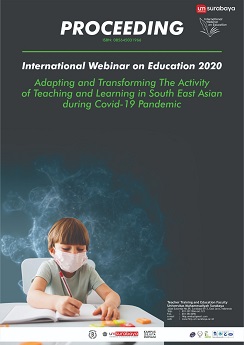The Effects of Online Learning on Pre-Service Teachers‟ Social Facilitation during Covid-19 Pandemic
Abstrak
Abstract.
Social facilitation is known as the tendency of people to perform tasks better
when it is simple and worse when it is complex, with presence of others. This paper aims to find out whether there is any effect of online learning with pre-service teacher‘s social facilitation during pandemic period or not. Online learning or E-Learning is one of distance learning methods, which nowadays massively used in almost all stages of education, especially during the worldwide-issued ‗work from home‘. The subjects are pre-service elementary teachers in Muhammadiyah University of Surabaya class of 2018. The method used in this research was qualitative description. The data collected from online survey with 45 respondents. Based on the data it was found that 97.7% of respondents conducted online learning, and 58.1% were having trouble understanding the material from online lectures. Material information obtained through online learning was less acceptable to respondents. 96.5% of them experiencing stark difference which more than half (66.3%) are having less enthusiasm to follow the online lectures. 97.7% respondent chose face to face meeting better than online learning. The results showed that they were inclined to do a better job or performance when they had not been alone or felt like they are being monitored and having other friend to share some thought, which could facilitate their behaviours.
Referensi
S. Barua, ―Understanding Coronanomics: The economic implications of the coronavirus (COVID-19) pandemic,‖ SSRN Electron. J. https//doi org/10/ggq92n, 2020.
S. H. Thorik, ―Efektivitas Pembatasan Sosial Berskala Besar di Indonesia Dalam Penanggulangan Pandemi Covid-19,‖ ’ADALAH, vol. 4, no. 1, 2020.
A. Kusmana, ―E-learning dalam Pembelajaran,‖ Lentera Pendidik. J. Ilmu Tarb. dan Kegur., vol. 14, no. 1, pp. 35–51, 2017.
T. I. M. P. J. JAUH and P. D. A. N. P. MUTU, ―PANDUAN VERIFIKASI BLENDED LEARNING.‖
D. Jamaluddin, T. Ratnasih, H. Gunawan, and E. Paujiah, ―Pembelajaran daring masa pandemik Covid-19 pada calon guru: hambatan, solusi dan proyeksi,‖ LP2M, 2020.
I. Naila and Q. Sadida, ―VALIDITAS PERANGKAT PEMBELAJARAN MATEMATIKA
BERBASIS SCAFFOLDING UNTUK SISWA SEKOLAH DASAR,‖ in PROCEEDING,
I. Naila, B. Jatmiko, and E. Sudibyo, ―Developing Entrepreneurship-oriented Project-based Learning Devices to Improve Elementary School Students ‘Collaboration Skills .,‖ Int. J. Innov. Sci. Res. Technol., vol. 4, no. 8, pp. 412–416, 2019.
S. J. Daniel, ―Education and the COVID-19 pandemic,‖ Prospects, pp. 1–6, 2020.
C. S. Marshall, S. Yamada, and M. K. Inada, ―Using Problemâ€based Learning for Pandemic Preparedness,‖ Kaohsiung J. Med. Sci., vol. 24, pp. S39–S45, 2008.
S. Agarwal and J. S. Kaushik, ―Student‘s perception of online learning during COVID pandemic,‖ Indian J. Pediatr., p. 1, 2020.
I. Naila, B. Jatmiko, and E. Sudibyo, ―Training Elementary Students‘ Collaborative and Entrepreneurship Skills Using Science Student Worksheet Based on Project Learning,‖ in 1st Borobudur International Symposium on Humanities, Economics and Social Sciences (BIS-HESS 2019), 2020, pp. 616–621.
S. G. Harkins, ―Social loafing and social facilitation,‖ J. Exp. Soc. Psychol., vol. 23, no. 1,
pp. 1–18, 1987.
R. B. Zajonc, ―Social facilitation,‖ Science (80-. )., vol. 149, no. 3681, pp. 269–274, 1965.
M. Sandelowski, ―Whatever happened to qualitative description?,‖ Res. Nurs. Health, vol. 23, no. 4, pp. 334–340, 2000.
C. F. Bond and L. J. Titus, ―Social facilitation: a meta-analysis of 241 studies.,‖ Psychol. Bull., vol. 94, no. 2, p. 265, 1983.
B. Guerin, ―Social facilitation,‖ Corsini Encycl. Psychol., pp. 1–2, 2010.
M. Gagne and M. Zuckerman, ―Performance and learning goal orientations as moderators of social loafing and social facilitation,‖ Small Gr. Res., vol. 30, no. 5, pp. 524–541, 1999.
N. B. Cottrell, D. L. Wack, G. J. Sekerak, and R. H. Rittle, ―Social facilitation of dominant responses by the presence of an audience and the mere presence of others.,‖ J. Pers. Soc. Psychol., vol. 9, no. 3, p. 245, 1968.
M. VanTuinen and S. P. McNeel, ―A test of the social facilitation theories of Cottrell and Zajonc in a coaction situation,‖ Personal. Soc. Psychol. Bull., vol. 1, no. 4, pp. 604–607, 1975.
M. J. Rockloff and V. Dyer, ―An experiment on the social facilitation of gambling behavior,‖ J. Gambl. Stud., vol. 23, no. 1, pp. 1–12, 2007.
T. Cole, D. J. K. Barrett, and M. D. Griffiths, ―Social facilitation in online and offline gambling: A pilot study,‖ Int. J. Ment. Health Addict., vol. 9, no. 3, pp. 240–247, 2011.






